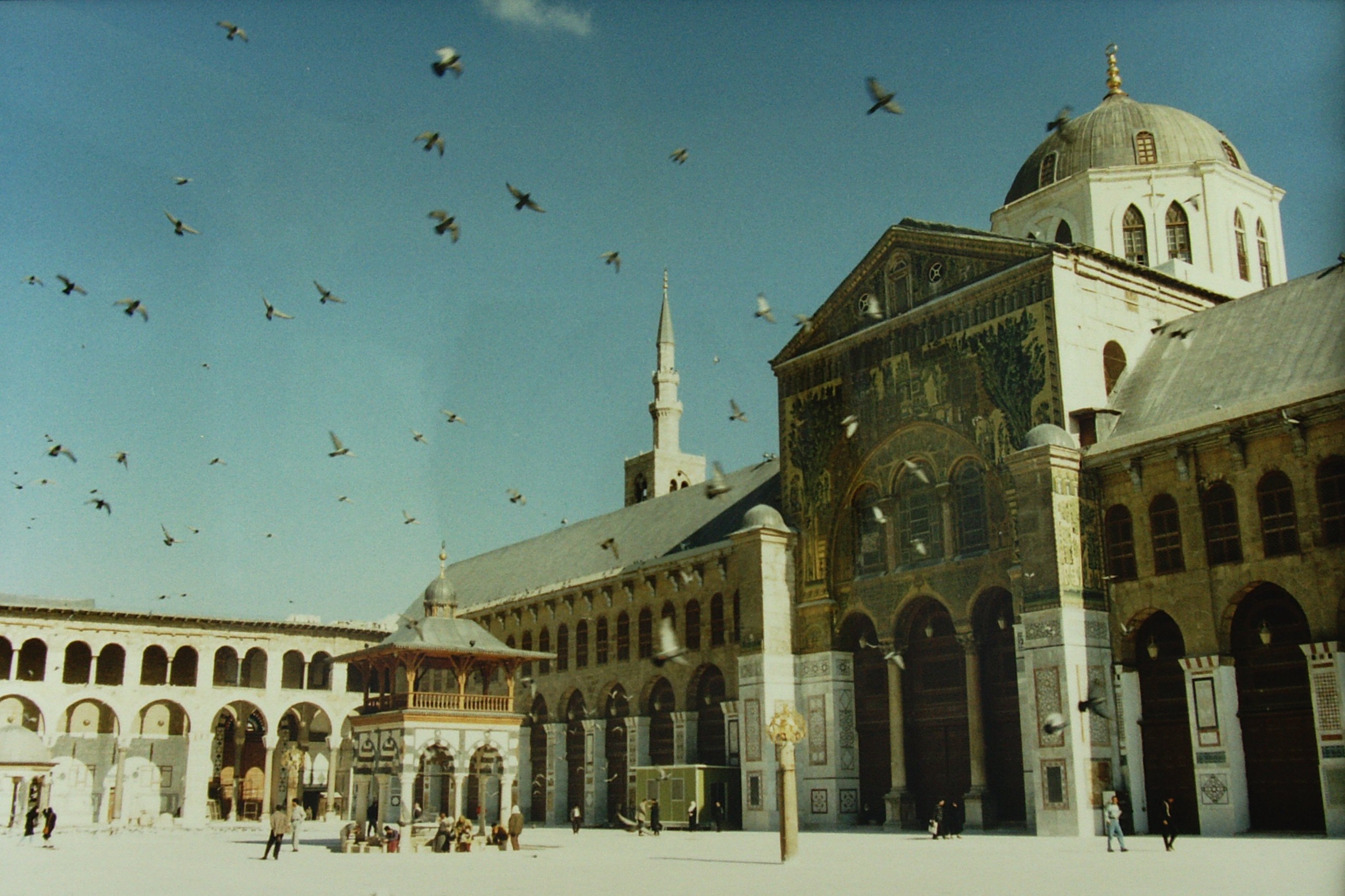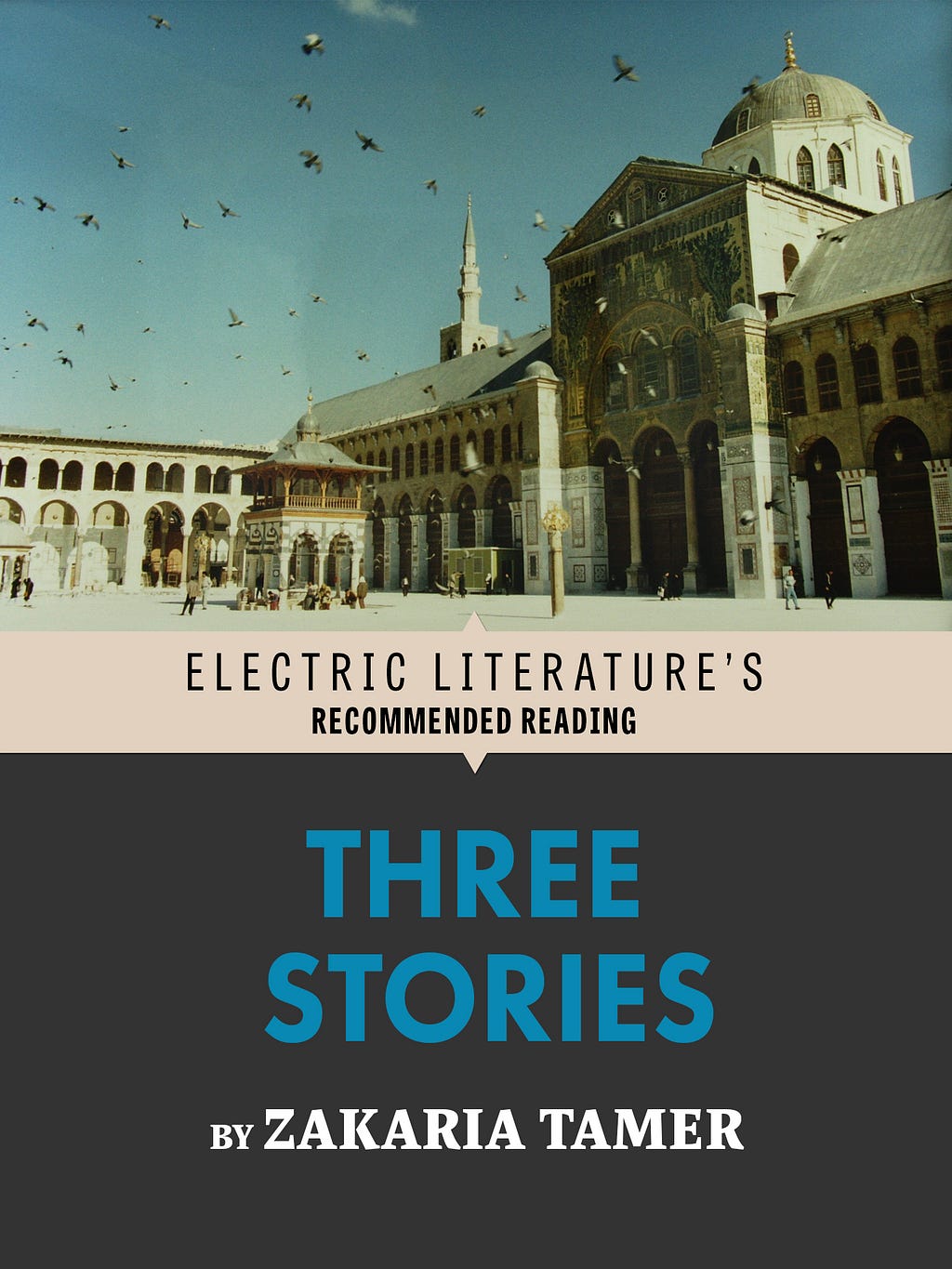Lit Mags
Three Stories by Zakaria Tamer
Stories of criminals, daughters, and feasts,

AN INTRODUCTION BY JENNIFER ACKER & HISHAM BUSTANI
Born in the Syrian capital of Damascus in 1931, Zakaria Tamer left school at the age of 13 to support his family as a blacksmith. Yet he managed to continue his education and began publishing short stories in newspapers in the late 1950s. At that time, and into the 1960s, the majority of Arab short story writers and novelists were immersing themselves in high hopes. Swept away by the dreams of liberty and progress put forward — falsely — by oppressive military dictatorships, authors were utilizing realism as the choice form for “mobilizing the masses,” and cheering for a propagandist role of literature. Zakaria Tamer, however, was one of the few, and maybe the first, who separated from the crowd. He chose to depict the grim present, and its catastrophic future. He departed from the prevailing dry, explicit narratives into dreamy, surreal, poetic forms of sarcasm, with subtle touches of melancholia and pain that still feel contemporary today.

In their superb economy, the form of Tamer’s masterly short pieces reflects a lifetime of working in journalism. In their haunting — and comic — descent into powerlessness, they reflect the reality of living under restrictive regimes. Tamer is a stealth writer. He sneaks up on you in the lightest of slippers and, skilled as the emperor’s tailor, unstitches your assumptions.
“Hassan al-Mazaz al-Shaghouri’s Final Victory” in particular is a prime example of this maestro’s piece-by-piece needlework, in which he manages to indict both the reader and the protagonist in the impoverished circumstances we find ourselves at the end: We end up naked and grinning despite the cold.
Jennifer Acker & Hisham Bustani
Co-editors, The Common Issue No. 11
Three Stories by Zakaria Tamer
Zakaria Tamer
Share article
Translated by Maia Tabet
Recommended by The Common
HASSAN AL-MAZAZ AL-SHAGHOURI’S FINAL VICTORY
HASSAN AL-MAZAZ AL-SHAGHOURI HAD NEVER COMMITTED an ordinary, everyday crime: he hadn’t killed or robbed anyone, had never raped a girl, had not joined a party — either pro- or anti-government — and not once had he set foot in a police station, jail, or court of law. He did not smoke in places where smoking was banned, could not name the current president if asked, and would have had no use for the sword of Khalid Bin al-Walid himself, other than to peel an orange or cut open a watermelon. Nevertheless, the vigilant security authorities that knew the unknowable saw fit to detain him and jail him for nine years without charge until, at the start of his tenth year in detention, he was led into a court of law to appear before a judge. Head lowered, he stood to attention, stealing sideways glances at the judge, who sat engrossed in a book about Italian pizza while repeatedly blowing her nose into white paper tissues. Hassan was stunned: wasn’t she his old neighbor? The one who had been notorious for her love of money and her lust for young men, for the easy credit terms she offered, and for her devotion to numerous husbands and lovers? He was about to ask her, and as he parted his lips and licked them with the tip of his tongue before speaking, a guard poked him with the butt of his rifle, silencing him, and instructing him to speak only when spoken to. Hassan al-Mazaz al-Shaghouri looked at the stern-faced guard and suddenly asked him in a cheerful but quiet voice, “Your face is familiar. Weren’t we schoolmates at Muawiyah? You’re the guy who specialized in stealing students’ lunches from their bags, aren’t you?” The guard had to suppress a smile to keep a straight, and stern, face. “And I remember you,” he said. “Weren’t you the one who specialized in stealing people’s shoes from mosques?”
Pointing at her, Hassan al-Mazaz al-Shaghouri was on the verge of saying something about the judge, but the guard stopped him. “Shush. The world has changed,” he said. “It’s different now: those once below are now above you.”

The judge closed her book and readied herself to speak. A fearful silence reigned over the room as she addressed Hassan al-Mazaz al-Shaghouri. In a stern voice, she told him that he was being released immediately and that, because he had been found undeserving of it, his citizenship had been withdrawn. He was therefore no longer entitled to remain in any of the country’s prisons. Dumbfounded, Hassan al-Mazaz al-Shaghouri told the judge that God’s earth was vast and that he and his wife and children would go someplace else as soon as he was able to sell his house. The judge informed him that the house no longer belonged to him following its sale at auction by the tax revenue authority to collect on unpaid taxes and the resulting fines. Hassan al-Mazaz al-Shaghouri replied with levity that the house was old, it was unbearably depressing, it had witnessed the birth and death of his father and four other of his ancestors, and the thought of dying there was not in the least attractive to him, whereupon the judge notified him that his wife was no longer his legally wedded spouse and that divorce proceedings had been initiated shortly after his arrest, to which news Hassan al-Mazaz al-Shaghouri retorted that were he a woman he would have ululated with joy, his wife having lost whatever beauty she once possessed and become a coarse-tongued gossip that he long ago would have divorced had it not been for the children. The judge now informed him that his small children too were no longer his, that they had been farmed out years ago to childless women who wanted to adopt them. That was the right thing to do, Hassan al-Mazaz al-Shaghouri told the judge, as his children were rowdy and quarrelsome and his heart had grown tired of filling the bottomless pits they had for bellies. His heart was also no longer his, the judge further informed him, since he had donated it for an organ transplant, to which Hassan al-Mazaz al-Shaghouri replied, “Good riddance to that which brought little besides pain and suffering,” and then begged the judge to also consider the donation of his stomach. His offer was accepted forthwith. The judge now ordered him to lie on the ground and for a pillow to be placed under his head, and as soon as those orders were carried out, both his guards and hers worked together on extracting his stomach, his heart, his kidneys, and his liver, following which, to the judge’s great surprise, a bloodied Hassan al-Mazaz al-Shaghouri stood up and beseeched her to let him go, that he might reach the border before nightfall. Although he appeared to be living, the judge pronounced him dead, and she refused his request as the guards carried him away and laid him down to rest inside a narrow hole in the ground, which they covered with cement while he carried on extolling the compassion of his neighbor, the judge, who by now appeared to have forgotten the deportation order she had issued and allowed him to remain within the bowels of the earth, enjoying a safe and peaceful life.
TABOO
AMINAH WATCHED HER elderly father getting ready to leave the house. “Who am I?” she asked him, smiling.
His response was instantaneous even though the question had surprised him. “Why, you’re my daughter! Who else might you be?”
“OK, what’s my name?”
“What kind of question is that? You think I’ve forgotten your name?”
“Never mind — indulge me.”
“Your name is Aminah.”
“And what day is it: Monday or Tuesday?”
“Today is Friday.”
“And where are you going?”
“I’m rushing off to the mosque for noon prayers… You know that good deeds cancel out bad ones, and our good deeds are all too few, as you are well aware!”
“And what are you doing afterward?”
“I will go and visit your late mother’s grave, may she rest in peace.”
“But it’s quite a ways from the mosque to the cemetery.”
“I’ll take a taxi.”
“Will you sit there and commune with her for hours?”
“Good heavens, I’m not so crazy as to start talking to the dead.”
“How long will you stay at the cemetery?”
“Just long enough to go in, read the fatiha, and come out again.”
“How will you leave the cemetery?”
“I will come out of the cemetery by the gate I used going in. Once on the street, I will hail a cab and go to your sister’s. There, I will spend time with her rambunctious children and cajole that husband of hers who’s always complain- ing that we don’t visit enough.”
“And how will you get home?”
“Your sister will call me a cab.”
The father chuckled, adding, “Look at me — I’m fit as a fiddle. There’s noth- ing to worry about. I’m sound of mind, and both my health and memory are just fine!”
Aminah thought this over in silence, smiling to herself, and then said, “So you’re basically saying that you’ll be gone three or four hours. How can you bear to leave me all alone that long in this big house?”
The old man chuckled and suggested she watch television or sleep. Aminah stretched lazily and declared that sleep was indeed the best thing.
She saw her father to the door and warned him to be careful crossing the street. He reminded her caustically that he wasn’t a small child. He promised to stick to safe routes where there were no crazy drivers and hurried off. Once outside, he slowly made his way toward the nearby mosque and entered, head bowed reverently, noting all the male worshippers lined up behind the imam. To stand right behind the imam was to ensure that the rewards and blessings of prayer were greatly magnified, and the old man therefore tried making his way to the front row, but he was pushed to the back by the shoving and jostling of arms and shoulders. This upset him, as he considered the back rows fit only for new congregants and not for long-standing ones like himself. He left the mosque muttering angrily, “It is He Who made you inheritors of the earth, and elevated some of you above others in degree in order to test you in what He bestowed upon you.” 1
No sooner had he taken a few steps toward the cemetery than he suddenly felt weak all over. Now, he no longer cared about any of the things he had meant to do and just wanted to get home. He walked back slowly, moaning under his breath, and beseeching the Almighty to let him die in his own bed and not sprawled at the feet of passersby on the street. He was groaning by the time he reached home, and he hastened to his room, noting the unnatural silence that reigned over the house. Aminah was surely asleep.
He was flabbergasted to find her in his large bed, bareheaded and naked, grinding down on a man younger than her whom he didn’t recognize, as if she wanted to make him plead for mercy and renounce his manhood. Horrified, the old man gasped in disbelief. He looked around the room desperately, and, catching sight of a white towel, he grabbed it with trembling hands and threw it over his daughter’s bare head.
“Do you not know that hair is taboo?!” he reprimanded. “And that it may not be seen by strangers? God help you in the next world!”
The old man was gladdened to see the blood drain out of Aminah’s face and to watch her shaking at the thought of what awaited her in the afterlife — praise the Lord, girls still feared the flames of hell! But he was offended by the rude conduct of the young man, who had run off without so much as a by-your-leave and left behind his cheap underwear — as if the house he’d been in had no owners.
EAT OF THE DELICACIES WE HAVE BESTOWED UPON YOU
IT WAS ALMOST TIME FOR LUNCH. The guests had grown tired of oohing and aahing over the properties, the streams, the lakes, the banks, the airplanes, and the beautiful women.
“You are about to behold a rare kind of sheep which you will soon be eating,” announced the master of the palace and surrounding farms, as he stood pointing with his right index finger at a giant television screen.
The guests stared at the screen, where a gaggle of beautiful young women, shapely and fair-skinned, their silky golden or jet-black hair streaming in the wind, picked flowers as they romped through a verdant garden filled with trees, cavorted in a turquoise pool, splashing one another and laughing, and finally sat around circular tables, surrendering themselves to ravenous and seemingly insatiable appetites as they devoured the finest foods. The master of the domain addressed his guests once more: “When sheep are upset or frightened, their meat is tough and leathery, and it tastes like sawdust. Our sheep enjoy only the happiest of lives, leaving their flesh succulent and juicy, so tender that it melts in the mouth and hardly requires chewing — moreover, they are all slaughtered in the prescribed, halal manner.” Turning to his eager assistant, the master added: “Yahya, please give our guests a brief summary of what is required for halal ritual slaughter.”
The assistant launched into the subject matter with alacrity, as if reading from a script. “Slaughter can be considered halal only if it meets the following requirements: the intended object must be alive at the time of slaughter and free of contagious disease; it must be led to the place of slaughter gently and without the use of force; the slaughterer must be a Muslim, who is of age, sound of mind, devout, and also skilled in his trade; before proceeding, he must invoke the name of God, intoning ‘Allahu akbar’ — ‘God is great’ — over the object of slaughter, or ‘Bismillah’ — ‘in the name of God’; the animal to be slaughtered must be positioned to face the qiblah, the direction of Mecca; the instrument of slaughter must be finely honed and made of metal, and the slaughtering cannot occur within sight of other animals; no part of the slaughtered animal may be cut away, and it may not be skinned or immersed in hot water before ascertaining that it has breathed its last and that it has bled in a manner commensurate with its size and type; further, the slaughter must be carried out manually, and the jugular veins, trachea, and esophagus must be severed.” The guests greeted the assistant’s words with audible sighs of impatience and loud yawns, prompting a chuckle from the master of the domain, who told them jokingly: “There’s also a fascinating and entertaining film of a sheep being slaughtered… Maybe you’d like to see that too, so as to be sure the meat is truly halal?”
The guests protested vehemently that it was time to eat — bellies and mouths needed satiating; this was no time for films and health education or nutritional counseling. The master of the domain led the way to the garden behind the house, where meat was grilling over charcoal embers, and the guests ate voraciously, insatiably, as he looked on, smiling, happy in the knowledge that his efforts had not been in vain, that they were recognized and appreciated. “God be praised,” he said in hushed and reverential tones. He expected that in the weeks to come, his guests would return his hospitality with banquets whose artistry would similarly delight and amaze diners.








